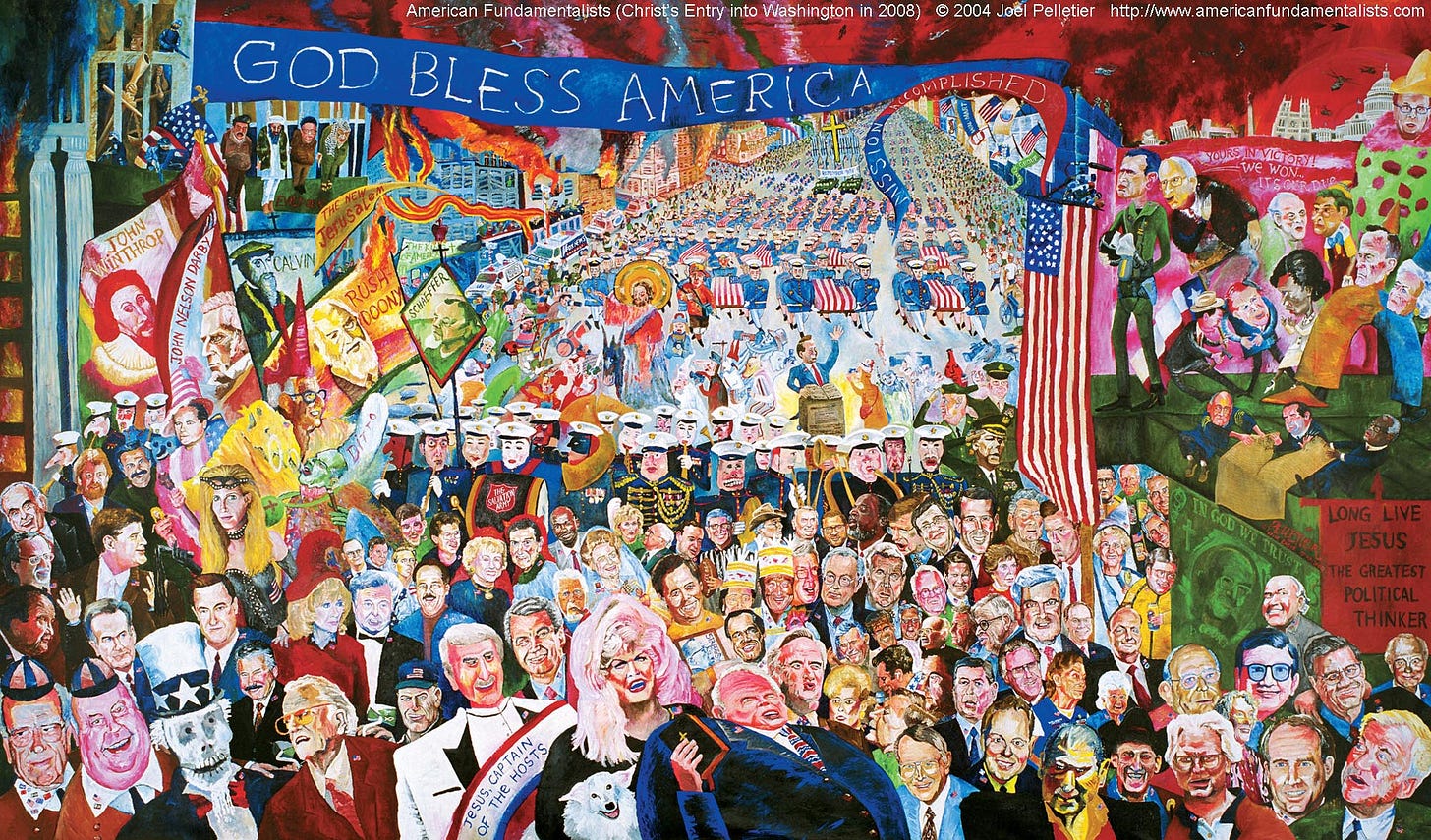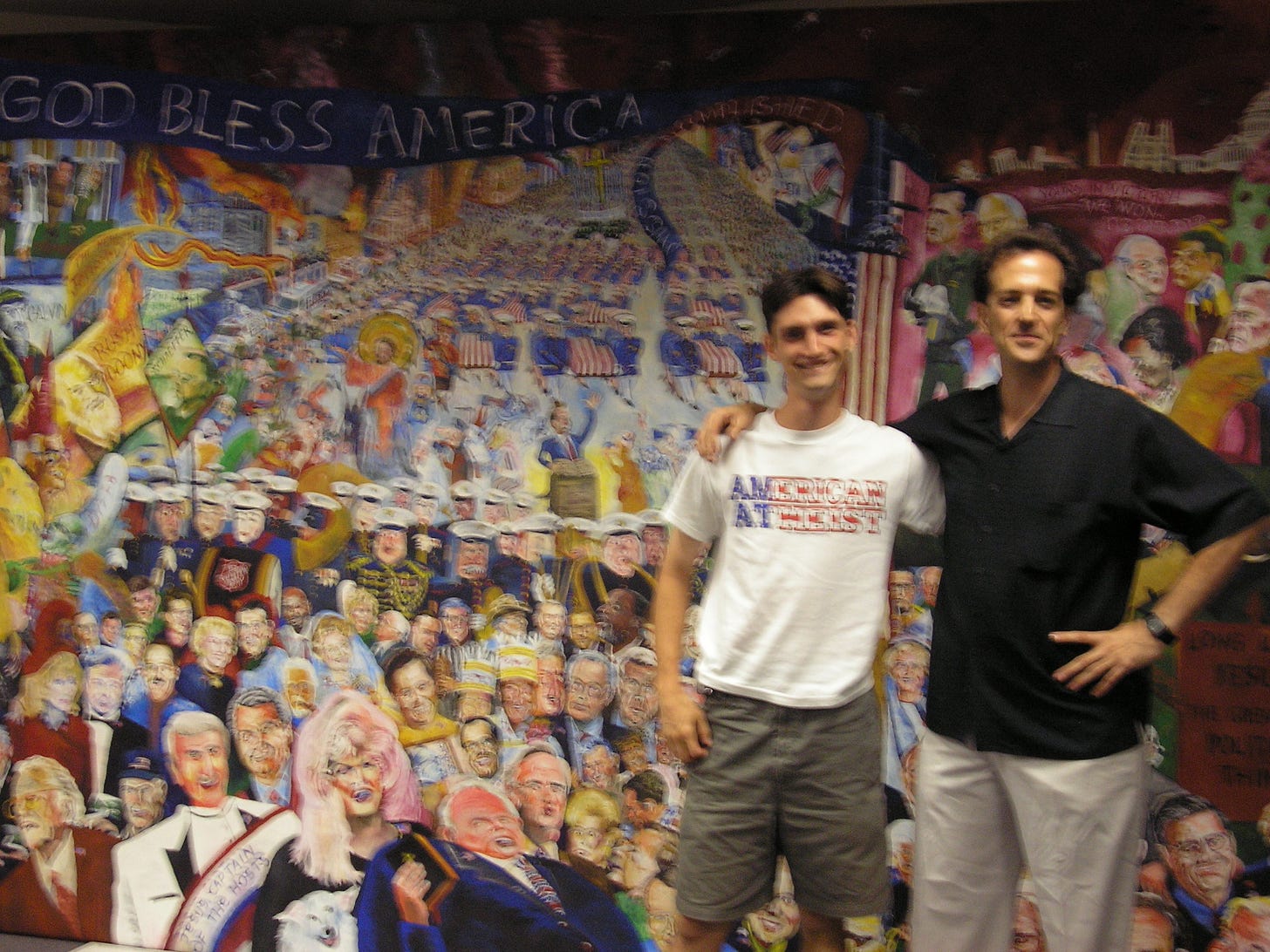The Culture War has become a Holy War
Trump's political and cultural victory is a religious one, at least in part.
In terms of political activism, I first cut my teeth with issues surrounding the separation of church and state, specifically with an issue in Chester county, Pennsylvania back in 2002-2004 (see here, here, and here) with my good friend Margaret Downey. The issue was that the courthouse in West Chester, Pennsylvania had a 10 Commandments plaque on display, and this just didn’t make us secular-minded people feel especially welcome or included in the community. All we wanted was secularism.
I had just started graduate school at West Chester University in January of 2002, from where I would earn a MA in Philosophy a year and a half later. I had developed an interest in religion after reading, in high school, the Bible (NRSV). I had a pretty secular upbringing, only occasionally attending church with older relatives on the high holidays. So my latent interest in religion led me to earn a degree in Religious Anthropology (BA) and to then continue with a master’s program focused on metaphysics and religion.
The atheist community, at that time about to explode with popularity due to the effects of 9/11, was a natural next step for me. My activism in the atheist and skeptic communities over the next decade introduced me to a number of people. From Richard Dawkins to PZ Myers, I began to rub shoulders with people who, years later, would largely despise one another. But along the way I began to form, and to write about, concerns about the growth of conservative Christianity’s influence over some parts of US politics.
Having grown up in a super-progressive world in downtown Philadelphia, where nearly everyone I knew was a progressive Democrat, it was natural that I would grow to despise the GOP. I joined groups who protested George W. Bush and his various policies. “Republican” became synonymous with the ‘Religious Right,’ and I was absolutely convinced that the Democratic party was the only viable option in terms of political support. I listened to almost nothing except NPR (WHYY in my case), I listened to Keith Olbermann like he was a prophet, and I thought Al Gore was robbed in 2000. That is to say that I was a good liberal Democrat. Hell, until c. 2017, I even watched Rachel Maddow, nearly daily.
So when I say that I was against the Right, especially their affinity for a version of Christianity which I found to be both new and terrifying, I want you to know where I’m coming from.
Trump, QAnon, and the shift of the Religious Right against ‘wokeness’
So when Donald Trump descended that escalator in 2015, let’s just say that I wasn’t enthusiastic. And as I watched the Religious Right fold themselves around him over the next year or so, all I could think of was this.

For the sake of context, I’ll even include a (blurry, unfortunately) picture of myself with Joel Pelletier, the artist of “American Fundamentalists,” from when he spoke at a meeting I helped organize in July of 2005 for the Freethought Society of Greater Philadelphia (now just the “Freethought Society”).
In other words, I took to heart Sinclair Lewis’ comment that "When fascism comes to America, it will be wrapped in the flag and carrying a cross." For many years, before the political advent of Donald Trump, I was worried about, wrote about, and was radicalized by the fear that the Religious Right was going to take over and obliterate the secular state which I admired and supported.
I carried many of these feelings into the early Trump era, and definitely took part in many of the protests against the Trump administration in 2017 and onward. But it was some events in my personal life which led me to start paying attention to a growing sense of uncertainty about the simplicity of this narrative, and to consider that maybe the reasons that some people supported Donald Trump weren’t as simple as we thought. To simply dismiss them as deplorable racist bigots was, I would come to believe, too simplistic of a narrative.
These days, I think that much of the fascism talk concerning Donald Trump is a little overblown. I don’t think that Trump’s re-election is history repeating; that we have ushered NAZI’s into power again. I think that this is something new, something we haven’t quite seen before, and I think that reverting to WWII terminology is a disservice to our ability to grasp the actual nature of what is happening right now. I think that NAZI-based narratives about Trump-world is blinding much of the progressive world from fully comprehending what is really going on here. I think that many of my progressive friends are actively dismissing and thus being actively ignorant of legitimate criticisms of some policies, ideologies, and actions by those on the Left/progressive spaces.
In short, much of what allowed Trump to win last year had to do with this self-righteous and elitist feeling within that progressive world. This political moment, which should be a time for reflection for the Democratic party and their liberal/progressive base, has only caused progressive activists to entrench themselves into safe corners of Bluesky, Tumblr, and their cute little inner-city neighborhoods where everyone thinks just like they do. At least they think that everyone thinks as they do, because I live in one of those neighborhoods, and I know I’m not the only heterodox/heretic in their midst.
But I’ll admit that back in 2015-2016 the instinct to attribute all of this Trumpism to fascism awoke in me as it still does for many. But since then, I’ve come to believe that this isn’t precisely what we were anticipating or fearing. In some ways it’s worse.
For everyone who is expecting a Handmaid’s Tale version of our future, expecting Trump acolytes to usher in a theocracy which will take over and eradicate all the liberals, LGBTQ+, atheists, communists, etc, I think that you are missing the boat, and I think I understand why you feel this way. I, after all, used to have a very similar view.
Donald Trump clearly isn’t a conservative Christian theocrat. And for all the actual theocrat wannabes out there, utilizing him as their Instrument of God, there are a lot of people who voted for Trump who not only don’t want such a theocracy but there are many Trump supporting atheists out there. This is not the Religious Right takeover that we expected back in 2005 because a lot of it is a reaction to another ideology which has many markings of theology.
None of us can pretend that much of the MAGA world isn’t ruled by a kind of theocratic vibe. Everything from QAnon to this Trump Bible demonstrate that the MAGA world is tapping into the same conservative Christian/dominionist movement which has been alive and well for as long as I’ve been alive. And as much as I tried to warn my fellow-progressive friends of the upcoming threat of theocracy, none of them took me seriously. I knew, 20+ years ago, that this movement would find a way to grab power. And, through Trump, they have. But what many progressives fail to understand is that it had to become a holy war for it to succeed.
The Progressives’ shift towards a new religiosity
As many writers have noted in recent years, the the progressive world started to shift significantly in terms of heir ideological convictions and their attitudes towards, for example, freedom of speech. I didn’t see it at first, from the inside, because I was blinded by the self-righteousness that over-swept the Progressive Left; a myopia which still obscures reality from activists and ideologues which I have largely left behind (I’m still a Leftist, but I can’t continue to be a part of the toxic tribalism of the social justice progressive world).
This neo progressive Puritanism, charted and chronicled by various writers in recent years, is still largely rejected as nonsensical by those still enamored by the set of progressive ideas which took over elite and corporate spaces in the last decade or so. Despite many articles and books by such thinkers as Yascha Mounk, Jonathon Haidt, Rob Henderson, Musa Al-Gharbi among others, the progressive world refuses to accept criticism as anything except conservative talking points. Anyone who criticizing the orthodoxy is, by definition, on the Right and probably a bigot.
In other words, they see it as part of the same old conservative claptrap that the progressive world has been fighting all along, when in fact something very important has shifted here and I don’t think that they have noticed. The many progressive beliefs rolled up into the ideologies referred to as wokeness, or the “successor ideology” as Wesley Yang calls it, do in fact have some things in common with religious, cultish, or at least tribal behaviors. Whereas John McWhorter makes this claim more starkly than I would (see this conversation between him and Nathan Robinson, for more on this), I think that the claim isn’t without merit, although I would say that this set of ideas supervenes upon tribalism in much the same way as religion does, as opposed to saying that it is a religion literally, as some still argue.
It is my belief that the Trump/MAGA political victory in November is tied to this association between a religious attitude within progressive spaces. In a sense, American politics has become a religious war between the more conservative Christian factions of politics one side, especially the cultural descendants of the protestant ethic (which most definitely influenced the Prosperity Gospel among other American Christian movements) and a newer (quasi-)religious movement on the “Progressive” Left on the other. We have become used to referring to this faction as the ‘woke’, but I agree that this term would be much more appropriately cited as something like Rob Henderson’s “luxury beliefs” or Yascha Mounk’s “identity synthesis.” Whatever we call it, it is essentially critical theory taken to it’s absurd logical conclusion. Theodore Adorno might be proud.
As these factions fight for political influence, the various factions, coalescing into what we have called the “Left” and the “Right,” the activists on both sides (Chris Rufo one one side, Ibram X. Kendi on the other, perhaps) begin to radicalize their tribes and narratives, talking points, and ideological battle lines form. For the “Left”, especially over the last 5 years, you learned to toe the line or get cancelled, post that black square or be racist, nod and smile during the DEI struggle session or risk getting fired. In other words, avoid heresy, blasphemy, and make sure you chant the correct incantations (tweets, Facebook likes, etc).
Jesse Singal’s recent experience on Bluesky is an example of how this plays out in todays’ political atmosphere. Jesse is a much-maligned character among the most extreme progressives, to the point where he has received many death threats and violent language directed at him for having a different perspective on some issues sacred to progressive activists around trans rights. Are his views about trans issues right? Maybe they are and maybe not, but the vitriol and hate aimed at him is very much what we have seen from intra-religious fights from time-immemorial. The massive block lists that allow users to block him and even anyone remotely associated with him are reminiscent of how, to use one example, Jehovah’s Witnesses will cut even family members off from anyone who leaves the fold. To have the wrong view is to be un-personed, much like the ending of White Christmas. In other words, it’s to be cast out, ostracized, or excommunicated.
The Koran advices death to heretics, and so do Bluesky progressive narratives demand similar threats. Different texts, same behavior. Just like religious arguments, there is little talk about who is right and why according to evidence (as if that mattered!), the responses are about him not bowing down to the correct beliefs, with very little said about why he is wrong. In fact, I tried to engage, respectfully, with people regarding their hatred of Jesse, and what I got was essentially he’s a bigot and I don’t have to listen to bigots.
This is what religious warfare—holy wars—looks like, not debate or political activism. The silos and echo-chambers of those who block heretics and create safe spaces for those with similar beliefs act as a means to further radicalize themselves into an extremist corner, increasing polarization.
We are now in a Holy War
Aside from the obvious arguments about policy, as well as the perpetual political squabbles between Democrats and Republicans which stretches back more than 150 years now, politics has become a part of the larger culture wars, and those culture wars have become largely one between two different tribal camps. And just like how those tribal instincts have influenced how all holy wars have been waged for millennia, much of the current conflict has flavors of religious warfare, especially between the hardest core ideologues on all sides of the various debates.
If you were to put MAGA-cultists in the same room as the most ardent LGBTQ+/BluAnon activists, it would look very much like what we witnessed between Protestants and Catholics in much of Europe during the 17th century. Hell, it would look like a debate between creationists and the most acerbic gnu-atheists from c. 2010. Would one have a better argument than the other? Yeah, maybe. Would I have much more in common with one over the other? definitely. Would I consider myself an advocate for either side? No. I don’t have a home with either of those groups, even if I would vote with one side over the other. Lesser-of-evils and all that.
For this situation to improve, both sides need to recognize that their views are tribal and, at least to some extent, religious in nature. For the MAGA people, they might say “no shit. Jesus gave us Trump to save America.” Fair enough. But I don’t think that the Progressive world is able to see their set of beliefs as being, especially among the most extreme holdouts, articles of faith more than they are based in reality.
And the MAGA world, with their executive orders to declare two sexes and make changes to Title IX are evidence that a lot of what drove people away from the policies of the Democratic party, associate the Progressive world with this extremist form of social justice activism. What drove them away was their distaste for the woke articles of faith.
And here I am, a skeptical atheist with heterodox views about all sorts of culture war issues, trying to tell my former tribal members that they need to allow criticism to be seen as something other than bigotry—or even heresy. Because even if their views were right (and I don’t think they always are), reacting to disagreement with vitriol and claims of bigotry is quite incriminating to how secure they are about how well their beliefs would hold up to scrutiny. Or, more poignantly, how much they have been willing to hold those ideas to scrutiny in the face of being accused of bigotry if they were to try.
All of us ‘heterodox’ folks trying to hold those ideas up to scrutiny are considered to be speaking in right-wing talking points. In other words, heretics. All we want to do is remove the faith, the orthodoxy, from the discourse. All we still want is secularism.






You're not alone. We politically homeless are many.
Excellent piece. I’ve been calling it the Cold Civil War. You make a good argument for adding Holy to the description